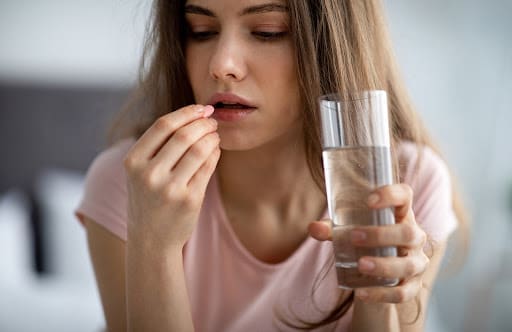
Amphetamines – more commonly referred to as ‘speed’ – are stimulants that impact the central nervous system. Like most stimulants, they’re known to provide a surge in energy and confidence and provide a euphoric ‘high’ when using. This is why they’re so popular at raves, parties and in club settings.
As well as being used for recreational purposes, amphetamines can be prescribed as a medical treatment for things like asthma, hyperactivity, ADHD and narcolepsy. Drugs such as Adderall and Ritalin are among the most popular amphetamine-based prescription drugs for disorders like ADHD, and they’re some of the most abused stimulants. A study published by the National Institute on Drug Abuse found that in 2018, the number of college students misusing drugs like Adderall was 11.1% of all enrolled students.
Whether prescribed or bought off the streets, amphetamines are highly addictive and can cause some serious problems to your physical and psychological health, even after just a few uses. For addicts taking higher doses for longer periods of time, these problems become increasingly more dangerous. But first, let’s look at some of the telltale signs of amphetamine addiction.
Signs and symptoms of amphetamine use/addiction
Unlike some other drugs, it’s not difficult to spot someone who is either using or withdrawing from amphetamines. The surge in confidence, talkativeness and energy soon becomes irritability, fatigue and a need to sleep for prolonged periods of time.
For someone who is addicted to amphetamines, these symptoms become more severe as their tolerance for the drug goes up, therefore their need to get their next fix has too.
Some of the psychological symptoms of an amphetamine addiction include:
- Excessive bursts of energy
- Short periods of euphoria
- Powerful cravings
- An inability to control doses
- Reduced social interactions
- An increase in fatigue between uses
- Severe mood swings
- Hostility or aggression
- A reduction in inhibitions
- Paranoia
Some of the physical symptoms include:
- Twitchiness
- Shaking and jittering
- Hyper fixation
- Sudden bursts of productivity
- An inability to sleep or stay still
- Malnutrition
- Nausea
- Seizures
- Dehydration
- Overhydration leading to brain swelling or death
- Blurred vision and headaches
For someone who have been prescribed amphetamine-based drugs like Adderall, for example, may experience some of these symptoms as side effects to their prescription. However, if these symptoms seem to be getting worse, they may have developed an addiction and need to seek professional help to detox from amphetamines.
Effects of amphetamine addiction
While amphetamines have clinical use, their potential for abuse and dependency is high. Some users seeking more powerful highs may crush and snort or inject amphetamines to produce strong effects more rapidly. By doing so, you put yourself in great danger.
Using amphetamines without the direction of a medical professional is extremely risky, especially when combined with alcohol or other drugs (which is often the case with recreational amphetamine users).
Abusing amphetamines – as with most class B drugs – can have some adverse immediate and long-term effects on your health. Some of which can be irreversible. Being addicted to amphetamines will start to impact all areas of your life quickly and start causing real problems with your relationships, work, social life as well as your personal health.
Some of the physical effects of amphetamine addiction include:
- Repetitive motor activity
- Malnutrition
- Loss of physical coordination
- Physical collapse
- Vitamin deficiency
- Cardiovascular system abnormalities
- Emaciation
- Respiratory depression
- Convulsions (seizures)
- Coma
- Death
Some of the psychological effects include:
- Increased physiological and behavioural disorders
- Toxic/amphetamine-induced psychosis
- Mental and behavioral changes
Social effects of amphetamine addiction include:
- Strained interpersonal relationships
- Divorce
- Job loss
- Financial ruin
Many people addicted to amphetamines often suffer with co-occuring mental health conditions, including:
- Depressive disorders
- Anxiety disorders
- Bipolar disorder
- Alcoholism
- Benzodiazepine abuse
- Schizophrenia
While these effects aren’t guaranteed for everyone who becomes addicted to amphetamines, abusing amphetamines puts you at risk of all of the above and the effects can creep up without you noticing. When you abuse amphetamines, you’re essentially playing Russian Roulette with these physical, social and psychological effects.
Amphetamine addiction treatment at Delamere
As for all addictive substances, the first step to recovery is a clinical detox. Our purpose-built treatment centre in the heart of Cheshire is designed with detox and recovery in mind. With ensuite private bedrooms for all of our guests, a caring team of medical and clinical professionals on-hand 24/7 – detoxing at Delamere is about as comfortable as it gets.
We don’t believe in one-size-fits-all when it comes to recovery, so we tailor all of our programmes to suit your specific, following a more holistic approach to recovery rather than adhering to the usual step-based programme.
As well as one-to-one and group therapy with leading counsellors, you will take part in equine therapy, art therapy, fire ceremonies, nature walks and more to give you a change of perspective, time to reflect and the tools needed as you start your transformation.
References
https://americanaddictioncenters.org/amphetamine
https://drugabuse.com/stimulants/amphetamine/https://www.beckleyfoundation.org/psychedelic-research-timeline-2/
https://www.verywellmind.com/psychedelic-therapy-how-does-it-work-5079161
https://psychedelicspotlight.com/what-is-psychedelic-assisted-therapy/0a%






